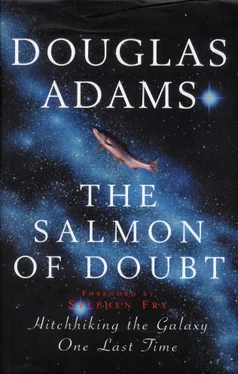So, suddenly, evolution ceases to be such a real problem get hold of. It’s rather like the following scenario: One Tuesday a person is spotted in a street in London, doing something criminal. Two detectives are investigating, trying to work out what happened. One of them is a twentieth-century detective and the other, by the marvels of science fiction, is a nineteenth-century detective. The problem is this: The person who was clearly seen and identified on the street in London on Tuesday was seen by someone else, an equally reliable witness, on the street in Santa Fe on the same Tuesday. How could that possibly be? The nineteenth-century detective could only think it was by some sort of magical intervention. Now, the twentieth-century detective may not be able to say, “He took BA flight this and then United flight that”—he may not be able to figure out exactly which way he did it, or by which route he traveled, but it’s not a problem. It doesn’t bother him; he just says, “He got there by plane. I don’t know which plane and it may be a little tricky to find out, but there’s no essential mystery.” We’re used to idea of jet travel. We don’t know whether the criminal flew BA 178, or UA 270, or whatever, but we know roughly how it was done. I suspect that as we become more and more conversant with the role a computer plays and the way in which the computer models the process of enormously simple elements giving rise to enormously complex results, then the idea of life being an emergent phenomenon will become easier and easier to swallow. We may never know precisely what steps life took in the very early stages of this planet, but it’s not a mystery.
But here’s the interesting thing. I said I wanted to ask, “Is there an artificial God?” and this is where I want to address the question of why the idea of a God is so persuasive. I’ve already explained where I feel this kind of illusion comes from in the first place; it comes from a falseness in our perspective, because we are not taking into account that we are evolved beings, beings who have evolved into a particular landscape, into a particular environment with a particular set of skills and views of the world that have enabled us to survive and thrive rather successfully. But there seems to be an even more powerful idea than that, and this is the idea I want to propose, which is that the spot at the top of the pyramid that we previously said was whence everything flowed, may not actually be vacant just because we say the flow doesn’t go that way.
Let me explain what I mean by this. We have created in the world in which we live all kinds of things; we have changed our world in all kinds of ways. That’s very, very clear. We have built the room we’re in, and we’ve built all sorts of complex stuff like computers and so on, but we’ve also constructed all kinds of fictitious entities that are enormously powerful. So do say, “That’s a bad idea, it’s stupid—we should simply get rid of it?” Well, here’s another fictitious entity—money. Money is a completely fictitious entity, but it’s very powerful in our world we all have wallets, which have got notes in them, but what can those notes do? You can’t breed them, you can’t stir-fry them, you can’t live in them, there’s absolutely nothing you can with them that’s any use, other than exchange them with each other—and as soon as we exchange them with each other, all sorts of powerful things happen, because it’s a fiction that we’ve all subscribed to. We don’t think this is wrong or right, good or bad; but the thing is that if money vanished, the entire cooperative structure that we have would implode, but if we were all to vanish, money would simply vanish too. Money has no meaning outside ourselves; it is something we have created that has a powerful shaping effect on the world, because its something we all subscribe to. I would like somebody to write an evolutionary history of religion, because the way in which it has developed seems to me to show all kinds of evolutionary strategies. Think of the arms races that go on between one or two animals living in the same environment—for example, the race between the Amazonian manatee and a particular type of reed that it eats. The more of the reed the manatee eats, the more the reed develops silica in its cells to attack the teeth of the manatee, and the more silica in the reed, the stronger and bigger the manatee’s teeth get. One side does one thing and the other counters it. As we know, throughout evolution and history, arms races are something that drive evolution in the most powerful ways, and in the world of ideas you can see similar kinds of things happening.
Now, the invention of the scientific method and science is, I’m sure we’ll all agree, the most powerful intellectual idea, the most powerful framework for thinking and investigating and understanding and challenging the world around us that there is, and it rests on the premise that any idea is there to be attacked and if it withstands the attack, then it lives to fight another day and if it doesn’t withstand the attack then down it goes. Religion doesn’t seem to work like that; it has certain ideas at the heart of it which we call sacred or holy or whatever. That’s an idea we’re so familiar with, whether we subscribe to it or not, that it’s kind of odd to think what it actually means, because really what it means is “Here is an idea or a notion that you’re not allowed to say anything bad about; you’re just not. Why not? Because you’re not!” If somebody votes for a party that you don’t agree with, you’re free to argue about it as much as you like; everybody will have an argument, but nobody feels aggrieved by it. If somebody thinks taxes should go up or down, you are free to have an argument about it, but if on the other hand somebody says, “I mustn’t move a light switch on a Saturday,” you say, “Fine, I respect that.” The odd thing is, even as I am saying that, I am thinking, “Is there an Orthodox Jew here who is going to be offended by the fact that I just said that?” but I wouldn’t have thought, “Maybe there’s somebody from the left wing or somebody from the right wing or somebody who subscribes to this view or the other in economics,” when I was making the other points. I just think, “Fine, we have different opinions.” But the moment I say something that something to do with somebody’s (I’m going to stick my neck out here and say irrational) beliefs, then we all become terribly protective and terribly defensive and say, “No, we don’t attack that; that’s an irrational belief, but no, we respect it.”
There’s a very interesting book—I don’t know if anybody here’s read it—called Man on Earth, by an anthropologist used to be at Cambridge, called John Reader, in which he describes the way that ... I’m going to back up a little bit and tell you about the whole book. It’s a series of studies of different cultures in the world that have developed within somewhat isolated circumstances, on islands or in a mountain valley or wherever, so it’s possible to treat them to a certain extent as a test-tube case. You see therefore exactly the degree to which their environment and their immediate circumstances have affected the way in which their culture has arisen. It’s a fascinating series of studies. The one I have in mind at the moment is the culture and economy of Bali, which is a small, very crowded island that subsists on rice. Now, rice is an incredibly efficient food and you can grow an awful lot in a relatively small space, but it’s hugely labour-intensive and requires a lot of very, very precise cooperation amongst the people there, particularly when you have a large population on a small island needing to bring its harvest in. People now looking at the way in which rice agriculture works in Bali are rather puzzled by it, because it is intensely religious. The society of Bali is such that religion permeates every single aspect of it and everybody in that culture is very, very carefully defined in terms of who they are, what their status is, and what their role in life is. It’s all defined by the church; they have very peculiar calendars and a very peculiar set of customs and rituals, which are precisely defined, and, oddly enough, they are fantastically good at being very, very productive with their rice harvest. In the seventies, people came in and noticed that the rice harvest was determined by the temple calendar. It seemed to be totally nonsensical, so they said, “Get rid of all this, we can help you make your rice harvest much, much more productive than even you’re, very successfully, doing at the moment. Use these pesticides, use this calendar, do this, that and the other.”
Читать дальше










